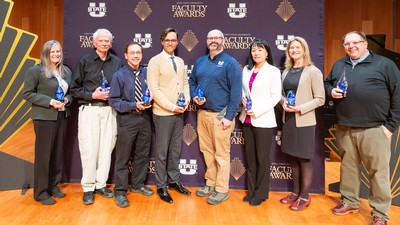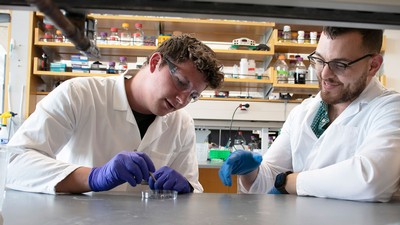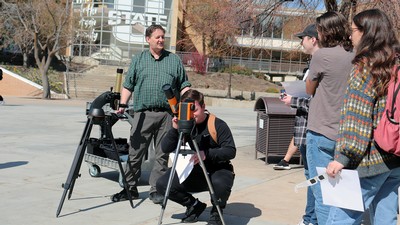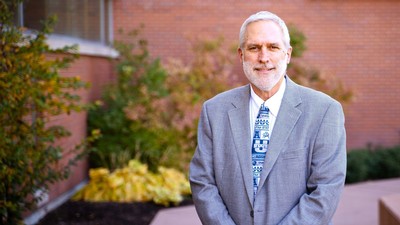USU Musicians to Perform Mass by Bach
Utah State University faculty, staff and students join members of the American Festival Chorus and a number of early music specialists to present Bach’s B Minor Mass Saturday, March 30, at 7:30 p.m. in the USU Performance Hall.
“Of all the many compositions of Johann Sebastian Bach, the B Minor Mass represents a combination of his musical genius and a statement of his devout Christian faith,” said Craig Jessop, dean of the Caine College of the Arts and conductor of the performance. “To bring this great musical creation to USU and to the citizens of this region is a great honor.”
Johann Sebastian Bach compiled the B Minor Mass in the final years of his life. Many of the sections in the mass come from Bach’s residence in Leipzig where he lived for almost 30 years, serving as the city’s director of choir and music.
“Reworking many earlier compositions to create B Minor Mass, Bach took the best examples from his compositional career and combined them into a work that stands as a monument to his skill and, perhaps, to his conception of the divine,” said Christopher Scheer, assistant professor of musicology in the Department of Music.
The work is a full Catholic mass, divided into four sections — first, “Kyrie and Gloria”; second, “Symbolum Nicenum” or “Credo”; third, “Sanctus”; and fourth, “Osanna, Benedictus and Agnus Dei.” Bach composed the sections at different times, beginning with the “Sanctus” section in 1724 and finishing with the “Credo” in the 1740s.
“Bach’s B Minor Mass is largely considered to be one of the greatest works of the western canon,” said Rebecca McFaul, violinist in the Fry Street Quartet and string faculty member in the Department of Music. “It is not often performed and was never performed in Bach’s lifetime, though it firmly holds its place as his Magnum Opus. It is our great privilege to prepare and give a performance of this work and to have focused this spring semester’s Collegium Musicum course largely on the topic of Bach’s masterpiece.”
The Collegium Musicum course, taught by Scheer, McFaul and Robert Waters of the Fry Street Quartet, focuses on challenging students’ conceptions of early music, or works written before 1750. Students in the class have worked with early music specialists to see firsthand the challenges musicians face when performing music from this period, said Scheer. The class originally started as a student project and has developed into a course offered for the first time in the 2013 spring semester.
“The opportunity to use one of the great masterworks in recorded history as a teaching opportunity for our school has been a wonderful experience on many levels,” said Robert Waters, violinist in the Fry Street Quartet and string faculty member in the Department of Music. “The many layers of discussion and discovery that this project has opened have been fascinating and very fruitful.”
Admission to B Minor Mass by Bach on March 30 is $15 general admission. For tickets and more information, visit the Caine College of the Arts Box Office, 139-B in the Chase Fine Arts Center, call 435-797-8022 or see the college’s Production Services website.
Related links:
- Caine College of the Arts Box Office
- USU Music Department
- Caine College of the Arts Production Services
- Caine College of the Arts
Writer: Kara Rindlisbacher, 435-797-9203, kara.rindlisbacher@usu.edu
Contact: Denise Albiston, 435-797-1500, denise.albiston@usu.edu
Craig Jessop, dean of USU's Caine College of the Arts, will conduct the performance of Bach’s "B Minor Mass" March 30, 7:30 p.m., USU Performance Hall. General admission tickets are $15.
Christopher Scheer
Rebecca McFaul (left) and Robert Waters (right)
Comments and questions regarding this article may be directed to the contact person listed on this page.








